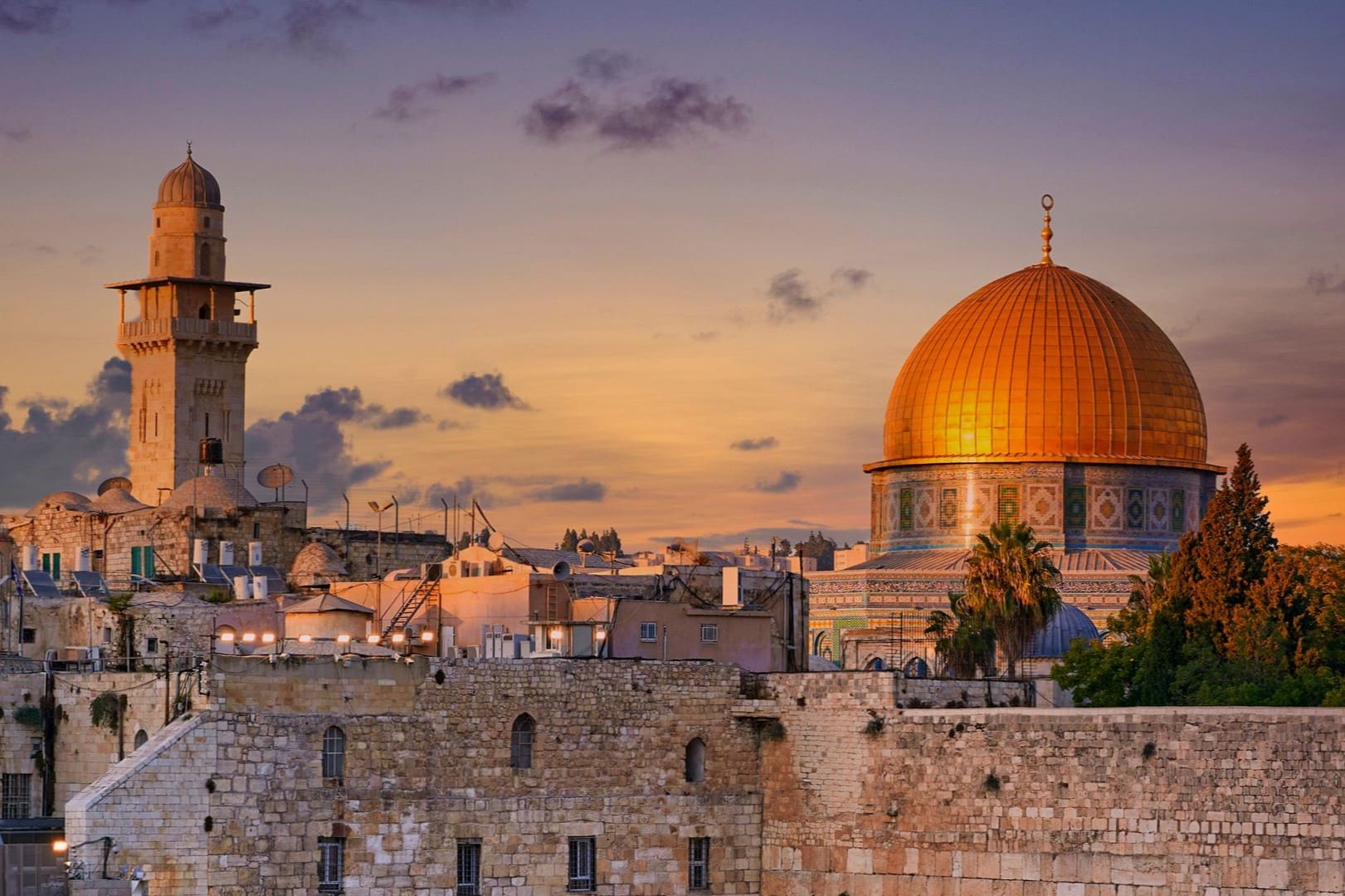Nestled in the heart of Jerusalem, the Al-Aqsa Mosque stands as an architectural marvel and a beacon of religious significance. Revered as the third holiest site in Islam, this mosque boasts a rich history, breathtaking beauty, and enduring spiritual importance. Let’s embark on a journey to unveil the wonders of Al-Aqsa, delving into its architecture, history, and cultural significance.
Facts About Al-Aqsa Mosque
The Al-Aqsa Mosque holds a place of immense reverence for Muslims worldwide. It is believed to be the very location from which the Prophet Muhammad ascended to heaven, a miraculous journey known as the Isra and Mi’raj. This event, a cornerstone of Islamic tradition, firmly establishes Al-Aqsa’s status as one of the three holiest sites in Islam, alongside Mecca and Medina.
Interestingly, before Mecca became the focal point of Muslim prayer, Al-Aqsa served as the direction Muslims faced during their daily prayers. This historical shift underscores the mosque’s enduring significance throughout Islamic history.
Often mistaken as the Al-Aqsa Mosque itself, the iconic golden Dome of the Rock is, in fact, a separate shrine located within the same complex. This sprawling complex is often compared to a campus, housing various buildings, each with its own unique history and religious significance. Muslims believe the Dome of the Rock marks the exact spot where the Prophet Muhammad embarked on his ascension to heaven.
Over the centuries, Al-Aqsa has undergone several renovations and expansions, particularly during the Umayyad, Abbasid, and Ottoman periods. Each dynasty left its architectural imprint on the mosque, adding layers of history and contributing to its unique blend of Islamic, Byzantine, and Gothic elements.
The mosque’s location in the Old City of Jerusalem, a site revered by multiple religions, has placed it at the center of major historical events, including the Crusades and the ongoing Arab-Israeli conflict. This historical backdrop has cemented Al-Aqsa as a powerful symbol of Palestinian resistance and identity, intertwining faith and politics in a complex tapestry.
Today, Al-Aqsa Mosque draws visitors from all corners of the globe who come to admire its striking blue tiles, intricate mosaics, and majestic minarets. Ongoing efforts are dedicated to preserving and restoring this architectural gem for future generations, ensuring its legacy lives on.
What is a fact about the Al-Aqsa Mosque?
Here’s a striking fact about the Al-Aqsa Mosque: Did you know it can accommodate up to 5,000 worshippers at once? This sprawling mosque complex, covering an area larger than three football fields, stands as a testament to the architectural prowess of its builders and the importance of this sacred site for Muslims worldwide.
As the third holiest site in Islam, Al-Aqsa’s significance lies in its connection to the Prophet Muhammad’s miraculous Night Journey. Muslims believe that the Prophet traveled from Mecca to Al-Aqsa in a single night and ascended to heaven from this sacred ground. This journey, recounted in the Quran, solidifies Al-Aqsa’s central role in Islamic tradition and its enduring spiritual aura.
Located in the heart of the Old City of Jerusalem, a place considered holy by Jews, Christians, and Muslims alike, Al-Aqsa has borne witness to centuries of history. The mosque’s resilience in the face of empires rising and falling, conflicts erupting and subsiding, speaks to its symbolic power as a beacon of faith and a testament to the enduring human spirit.
The mosque’s architecture is a captivating blend of Islamic, Byzantine, and Gothic styles, reflecting the diverse cultural influences that have shaped Jerusalem over the centuries. The shimmering mosaics, the towering minarets, and the iconic blue tiles characteristic of Islamic architecture create a visual feast for the eyes.
The name “Al-Aqsa,” meaning “the farthest mosque,” is believed to refer to the Prophet Muhammad’s miraculous night journey, emphasizing the mosque’s spiritual significance as a destination for pilgrimage and a place of profound religious importance.
Why is Masjid Al-Aqsa so special?
Masjid Al-Aqsa captivates visitors with its sheer architectural grandeur. The silver-domed mosque, adorned with intricate mosaics and mesmerizing tilework, stands as a testament to the artistic brilliance of Islamic architecture. It’s a place where history comes alive, transporting visitors back to the Umayyad period, offering a glimpse into the architectural splendor of a bygone era.
However, Al-Aqsa’s significance extends far beyond its aesthetic beauty. For Muslims, it holds the prestigious title of the third holiest site in their faith. This revered status stems from the belief that it was from this very spot that the Prophet Muhammad embarked on his miraculous Night Journey, ascending to heaven and solidifying Al-Aqsa’s place in Islamic history. Every year, millions of pilgrims from around the world converge on this sacred ground, seeking spiritual enlightenment and a connection to their faith’s roots.
Al-Aqsa’s historical significance deepens when we consider its location. Built on land considered sacred for millennia, it stands on what Muslims believe to be the ruins of the Temple of Solomon, a site of immense importance in Jewish tradition known as the Temple Mount. This convergence of religious narratives underscores Al-Aqsa’s unique position as a site of layered history and interfaith significance.
Unfortunately, this convergence has also been a source of tension and conflict. Al-Aqsa’s location in Jerusalem, a city claimed by both Palestinians and Israelis, has placed it at the heart of a complex geopolitical struggle. For Palestinians, the mosque represents a powerful symbol of their identity and resistance in the face of adversity. However, Israeli authorities have at times imposed restrictions on access and worship at the site, further fueling tensions and highlighting the need for sensitive and respectful dialogue.
Despite these challenges, Al-Aqsa remains a treasure trove of history and archaeology. Beneath its surface lie remnants of ancient structures, whispering tales of civilizations past and offering insights into life in this region thousands of years ago. Al-Aqsa’s enduring presence serves as a testament to the power of faith, reminding us of its ability to endure even amidst complexities and conflict.
The story of Al-Aqsa continues to unfold as archaeologists and historians unearth new discoveries, shedding further light on the mosque’s intricate past. Each new finding adds to the tapestry of knowledge surrounding this awe-inspiring site, beckoning us to appreciate its rich history and the enduring power of faith.
How holy is Al-Aqsa Mosque?
The Al-Aqsa mosque holds a place of immense reverence within Islam, ranking as the third holiest site after Mecca and Medina. This esteemed position is deeply rooted in the belief that the Prophet Muhammad ascended to heaven from this very location during his miraculous Night Journey. This event, a pivotal moment in Islamic history, underscores Al-Aqsa’s profound spiritual significance.
The Al-Aqsa mosque is part of a larger compound known as the Haram al-Sharif, or “Noble Sanctuary.” This sacred complex also houses the iconic Dome of the Rock, the golden-domed shrine believed to mark the exact spot where the Prophet Muhammad began his ascent to heaven. The mosque itself is an architectural marvel, capable of accommodating over 5,000 worshippers, and its beauty is equally breathtaking. From the intricate tilework and mosaics to the elegant calligraphy, every detail speaks to the rich artistry of Islamic architecture.
Beyond its religious importance, Al-Aqsa holds deep cultural and political significance, particularly for Palestinians who view it as a powerful symbol of their identity and resilience. Despite facing challenges throughout history, including the ongoing Israeli-Palestinian conflict, the mosque remains a beacon of hope and a testament to the enduring strength of faith. Muslims worldwide continue to visit Al-Aqsa, drawing inspiration from its history and connecting with their faith in a truly profound way.
Who built the Masjid al-Aqsa?
The question of who built Masjid al-Aqsa is a bit of a historical puzzle. There is no definitive answer, and the mosque’s origins are shrouded in a mix of historical evidence and religious tradition. Let’s examine some of the most prominent theories:
Theory 1: Prophet Adam
Some believe that Prophet Adam, considered the first human in Islamic tradition, may have been the original builder of the mosque. This theory suggests that what better place for the first human to worship than the site where creation itself began?
Theory 2: Prophet Ibrahim
Another theory attributes the mosque’s construction to Prophet Ibrahim (Abraham), revered as the father of monotheism. According to this account, Ibrahim built the mosque during his pilgrimage to Jerusalem. This theory holds weight due to Ibrahim’s significant role in the development of religion in the region and his extensive travels.
Theory 3: The Umayyad Caliphs
While the first two theories are rooted in religious tradition, historical records point to a stronger likelihood that the Umayyad Caliphs, particularly Abd al-Malik and al-Walid I, played a pivotal role in constructing and renovating Masjid al-Aqsa in the 7th century CE. This doesn’t necessarily mean they built the mosque from scratch, but their contributions likely shaped the structure into the architectural marvel we see today.
A Tapestry of History
It’s important to remember that Masjid al-Aqsa, like many ancient structures, has undergone various renovations and expansions over the centuries. Different rulers and dynasties have contributed to its construction, adding layers of history and architectural diversity to the mosque.
An Enduring Mystery
While the definitive answer to who built Masjid al-Aqsa might forever remain a mystery, what’s certain is that this holy site has served as a beacon of faith for centuries. It stands as a testament to the dedication of countless individuals who sought to create a place of worship and connection with the divine.
What does al-Aqsa mean in English?
The name “Al-Aqsa” translates to “The Farthest Mosque” or “The Farthest Sanctuary” in English. This seemingly simple translation belies a profound meaning rooted in Islamic tradition.
While geographically, “Al-Aqsa” might refer to the mosque’s distance from Mecca, the holiest city in Islam, its meaning extends beyond physical location. The name is believed to be derived from the Quran’s account of the Prophet Muhammad’s miraculous Night Journey. According to this account, the Prophet traveled from Mecca to “the farthest mosque” in Jerusalem, where he ascended to heaven.
Therefore, the name “Al-Aqsa” is more than just a geographical marker; it symbolizes this incredible journey and the mosque’s pivotal role in Islamic history and faith. It serves as a constant reminder of the mosque’s significance as a place of pilgrimage, worship, and deep spiritual connection for Muslims worldwide.
What happened at Al-Aqsa Mosque?
The Al-Aqsa mosque, a beacon of peace and spirituality for Muslims, has witnessed a series of troubling events, particularly during the holy month of Ramadan, a time meant for reflection and prayer. These events have sparked international concern and raised questions about the safety and respect afforded to this sacred site.
Here’s a closer look at the situation:
- Israeli Actions During Ramadan: During Ramadan, a period of heightened religious sensitivity, Israeli security forces have entered the Al-Aqsa Mosque compound multiple times, leading to clashes with Palestinian worshippers. These incursions have resulted in arrests, injuries, and a heightened sense of insecurity within the Muslim community.
- Palestinian Perspective: Many Palestinians perceive these actions as attempts to stifle their presence at the mosque and maintain tight control over the compound. They believe their right to worship freely is being infringed upon, further fueling tensions and resentment.
- Religious Freedom Concerns: Muslim leaders and worshippers worldwide have condemned these events as violations of religious freedom and blatant disrespect for the sanctity of this holy site. The intrusion of security forces into a place of worship, particularly during a time of religious observance, is seen as deeply offensive and provocative.
- Disputed Ownership and Control: The underlying issue fueling these tensions is the ongoing dispute over the ownership and control of Al-Aqsa Mosque. While Israel claims sovereignty over the entire compound, Palestinians and many in the Muslim world believe it to be an exclusively Muslim holy site. This fundamental disagreement lies at the heart of the conflict.
- A Symptom of a Larger Conflict: The events at Al-Aqsa Mosque are tragically symptomatic of the protracted Israeli-Palestinian conflict. The mosque’s location in a contested city, claimed by both sides, makes it a flashpoint for tensions, reflecting the broader struggles over land, identity, and religious freedom.
It’s crucial to stay informed about the fluid situation at Al-Aqsa Mosque, as the events are dynamic and information can change rapidly. Relying on reputable news sources and diverse perspectives is essential for a balanced understanding of this complex issue.
Discover more about the wonders of the world:
- Unravel the mysteries of Abu Simbel Temple and uncover the fascinating facts behind its grandeur and architectural brilliance.
- Embark on a journey to the Cliffs of Moher, Ireland’s natural wonder, and discover the captivating facts that have drawn travelers for centuries.
- SYBAU See You Baby Meaning: Gen Z Slang Evolves - July 1, 2025
- Unlock Your Inner Youth: Lifestyle Secrets for a Vibrant Life - July 1, 2025
- Decode SYBAU Meaning: Gen Z Slang Explained - July 1, 2025






